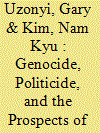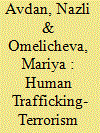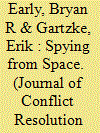| Srl | Item |
| 1 |
ID:
181162


|
|
|
|
|
| Summary/Abstract |
In intractable conflicts, what factors lead populations to accept negotiated outcomes? To examine these issues, we conduct a survey experiment on a representative sample of the Jewish Israeli population and a companion experiment on a representative sample of Palestinians in the West Bank and Gaza. We find that holding the negotiated settlement outcome constant, approval of the settlement is strongly influenced by whether it is framed as a negotiating defeat for one side—if and only if respondents are primed to be indignant—and that these effects are strongly mediated by perceptions of the fairness of the settlement outcome. Moral indignation produces a desire for concessions for concession’s sake. Such conflicts over political framing violate assumptions of the rationalist literature on conflict processes and suggest important new directions for conflict theorizing.
|
|
|
|
|
|
|
|
|
|
|
|
|
|
|
|
| 2 |
ID:
181163


|
|
|
|
|
| Summary/Abstract |
Why do some autocracies democratize? A country’s violent past has received little attention. We argue that genocide and politicide undermine democratization by binding the elites’ supporters more tightly to the governing power, while cementing in-group/out-group animosities, and helping preserve the elites’ status quo position within the state. We test this argument on a new dataset of government atrocity and democratization since 1900. These novel data allow us to capture many important instances of atrocity missed by others, and thus take a longer look at democratization and violence throughout history. We find that episodes of genocide and politicide are associated with a lower likelihood of democratization in both the short and long run. These effects are larger and more consistent than other common explanations for democratization. They also differ from the effects of non-genocidal civil war violence.
|
|
|
|
|
|
|
|
|
|
|
|
|
|
|
|
| 3 |
ID:
181165


|
|
|
|
|
| Summary/Abstract |
Why do some militant organizations participate in human trafficking? We investigate this question by introducing a new dataset that records insurgent organizations’ involvement in four types of human trafficking: sexual exploitation, forced recruitment, slavery, and kidnapping. Marrying our data to the BAAD2I population of insurgent organizations, we uncover the organizational attributes related to human trafficking. We find that groups with wide alliance networks and territorial control are more likely to commit human trafficking. Organizations that are losing command of the territory and suffering rank-and-file losses are also more likely to turn to human trafficking. Our study sheds theoretical light on insurgent groups’ involvement in crime. It also contributes to the empirical scholarship on sexual violence by violent groups by studying different forms of human trafficking in both conflict and non-conflict environments. Our paper presents an original dataset and empirical analysis of insurgent groups’ human trafficking patterns.
|
|
|
|
|
|
|
|
|
|
|
|
|
|
|
|
| 4 |
ID:
181161


|
|
|
|
|
| Summary/Abstract |
Policymakers and peacebuilding research often focus on rebel groups when studying demobilization and integration processes, but post-war governments must also manage the non-state militias that helped them gain or maintain power. Why do some post-war governments disintegrate their militia allies, while others integrate them into the military? We argue that when a salient ethnic difference exists between the (new) ruling elite and an allied militia, a process of mutual uncertainty in the post-war period will incentivize governments to disintegrate the group. However, governments will be most likely to integrate their militias when the military has sufficient coercive capabilities but few organizational hindrances to re-organizing. Using new data on the post-war fates of victorious militias across all civil conflicts from 1989 to 2014, we find robust support for these claims. The results suggest that a government’s optimal militia management strategy is shaped by both social and organizational constraints during the post-war period.
|
|
|
|
|
|
|
|
|
|
|
|
|
|
|
|
| 5 |
ID:
181164


|
|
|
|
|
| Summary/Abstract |
Despite considerable interest and debate, it has proven surprisingly difficult to demonstrate a systematic link between technological change and patterns of war and peace. At least part of the challenge may reside in finding the right place to “look” for such relationships. Technological change alters what nations can do to one another (capabilities), but in ways that are typically reflected by deals (diplomatic bargains) rather than actions. We theorize that reconnaissance satellites have revolutionized the use of information gleaned from spying in ways that discourage states from engaging in serious conflicts with one another. We analyze the impact of reconnaissance satellites on high-casualty militarized interstate disputes (MIDS) between dyads from 1950 to 2010. We find that when either the potential aggressor or target in a dyad possess reconnaissance satellites, they are significantly less likely to become involved in serious MIDs. This effect is especially powerful when both states possess reconnaissance satellites.
|
|
|
|
|
|
|
|
|
|
|
|
|
|
|
|